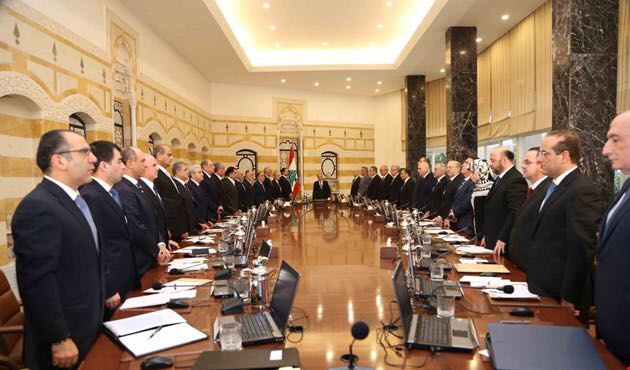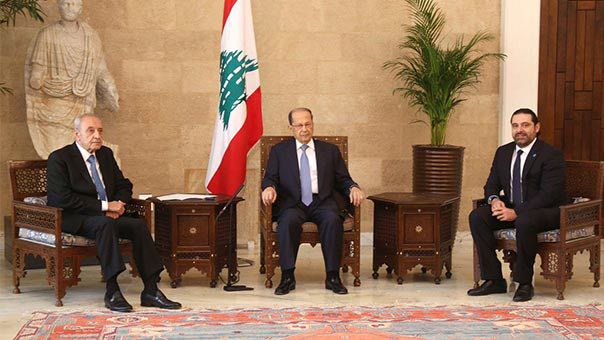Lebanon’s Fragile Politics: Critical Issues and Open disputes
Abdullah Malaeb
13 أكتوبر 2017

أنباء الشباب
Lebanon’s Prime Minister Saad al-Hariri, parliamentary speaker Nabih Berri, President Michel Aoun have been stressing that there is no rift between them ever since Aoun’s return to the presidential palace. However, statements issued by the three officials highlight a disagreement over domestic and foreign policies.
The disagreements between President Michel Aoun and Speaker Nabih Berri have been highly recorded since the inauguration of Aoun. In May 2017, discrepancies between Berri and Aoun prevailed over constitutional matters. The two officials disagreed over “authorities” and interpretation of the constitution. Recently, tensions between Aoun and Berri were recorded due to disagreements over the salary scale, tax hikes, state budget and auditing of extra-budgetary spending in previous years. The modification to Article 87 which requires an audit – of previously unaccounted-for spending as well as proposed budgetary spending – before passing the public budget is the main topic of disagreement between the two officials.
Also, the relationship between Baabda, Ain al-Tineh, and Beit al-Wasat has stuck over a crucial issue – Berri’s proposal to hold parliamentary elections before the end of the year. This proposal will be featured on next week’s Parliament agenda according to sources from Development and Liberation bloc. However, the fate of this proposal is in the hands of the Minister of Interior Affairs Nouhad Machnouk, who will decide whether the logistical arrangements for elections allow the implementation of Berri’s proposal.
Disagreements on foreign policies have also contributed to the fragile relationship joining the three officials. The government lately hit a new failure. Following quite a while of formally boycotting the Syrian administration, two Lebanese ministers visited Damascus to take part in a global exchange reasonable and converse with their Syrian partners, carrying inquiries of Beirut’s clashing relations with Syria and Saudi Arabia to the fore.
In spite of the fact that the visit was not officially endorsed by the Lebanese government or Prime Minister Saad Hariri, it happened. Lebanese Minister of Agriculture Ghazi Zaiter and Minister of Industry Hussein Hajj Hassan, of Hezbollah, were shot under pictures of Syrian President Bashar Assad, who has led his country through the convulsions of civil war since 2011. These reckless actions from the ministers of hezbollah are predictable. However, Aoun’s international visits opened the doors to a greater discussion regarding the risks of a political decay. Amid his visit to the UN board, Aoun addressed a few news outlets, earlier and amid his outings, praising the part of Hezbollah as a true blue protection compel and attesting that Iran has at no time intruded in Lebanon’s local issues. These statements angered many Lebanese who interpreted Aoun’s claims as controversial or even incorrect.

However, what continues to confuse international actors is the apparent submissiveness of Hariri, who is concerned about president Aoun’s acts and hopes that at some point Hezbollah and Aoun will show the political good refinement to stop embarrassing him in front of his Saudi supporters, hence putting an end to Lebanon’s bipolar politics.
Finally, Lebanon’s society perceives Nabih Berri as the leading conductor of Lebanese politics alongside MP Walid Joumblatt who is labeled as the Lebanese political kingmaker in spite of his wide vacillations between positions. For that reason, Lebanon is currently awaiting the rise of a political leader or a political movement that would bring Lebanon’s political decay to an end. After 11 months of his inauguration, president Aoun did not establish a rigid government until this moment. He is striving to resist amidst major clashes between his policies and the agenda of political leaders who brought him, through a semi-grand coalition, to Baabda Palace.
(Anbaa Ash- Shabab, Al Anbaa)
 عن أمل جنبلاط المتجدد: لبنان يستحق النضال
عن أمل جنبلاط المتجدد: لبنان يستحق النضال
 صحافيون أم عرّافون!
صحافيون أم عرّافون!
 ماذا يجري داخل أروقة بيت الكتائب المركزي؟
ماذا يجري داخل أروقة بيت الكتائب المركزي؟


 عن الخرائط التي تُرسم والإتفاقات التي تتساقط!
عن الخرائط التي تُرسم والإتفاقات التي تتساقط!
 “الإنحراف في الحياة”/ بقلم كمال جنبلاط
“الإنحراف في الحياة”/ بقلم كمال جنبلاط
 هاشتاغ #صار_الوقت يحل أولاً في حلقة جنبلاط
هاشتاغ #صار_الوقت يحل أولاً في حلقة جنبلاط
 طاولة نقاش عن أزمة الصحافة في جامعة AUST
طاولة نقاش عن أزمة الصحافة في جامعة AUST
 عبدالله: ليظهر لنا وزير مكافحة الفساد حرصه في صفقات البواخر والفيول
عبدالله: ليظهر لنا وزير مكافحة الفساد حرصه في صفقات البواخر والفيول
 عبدالله: غريب أمر وزارة مكافحة الفساد!
عبدالله: غريب أمر وزارة مكافحة الفساد!

 Comment to Uri Avnery: How Sad What Is Looming Ahead
Comment to Uri Avnery: How Sad What Is Looming Ahead
 “Not Enough!”
“Not Enough!”
 … لمن لم يقرأ يوسف البعيني/ بقلم وسام شيّا
… لمن لم يقرأ يوسف البعيني/ بقلم وسام شيّا
 كمال جنبلاط في مولده الأول بعد المائة: تعاليمه وأفكاره ما زالت الحلّ/بقلم عزيز المتني
كمال جنبلاط في مولده الأول بعد المائة: تعاليمه وأفكاره ما زالت الحلّ/بقلم عزيز المتني
 رئيس حزب/ وليس (… سابقاً)/ بقلم د. خليل احمد خليل
رئيس حزب/ وليس (… سابقاً)/ بقلم د. خليل احمد خليل
 التوازن السياسي في لبنان
التوازن السياسي في لبنان
 لبنان… مشاريع انقلابية مؤجلة
لبنان… مشاريع انقلابية مؤجلة
 جنبلاط وحَمَلة أختام الكاوتشوك
جنبلاط وحَمَلة أختام الكاوتشوك
 Le Liban est un symbole de tolérance
Le Liban est un symbole de tolérance
 Our Automated Future
Our Automated Future
 The True Origins of ISIS
The True Origins of ISIS
 Les Misérables vs. Macron
Les Misérables vs. Macron
 عذراً أيها المعلم/ بقلم مهج شعبان
عذراً أيها المعلم/ بقلم مهج شعبان
 رساله الى المعلم / بقلم ابو عاصم
رساله الى المعلم / بقلم ابو عاصم
 إلى روح القائد والمعلم كمال جنبلاط/ بقلم أنور الدبيسي
إلى روح القائد والمعلم كمال جنبلاط/ بقلم أنور الدبيسي
 أسرار وعناوين الصحف ليوم الجمعة 14 كانون الاول 2018
أسرار وعناوين الصحف ليوم الجمعة 14 كانون الاول 2018














